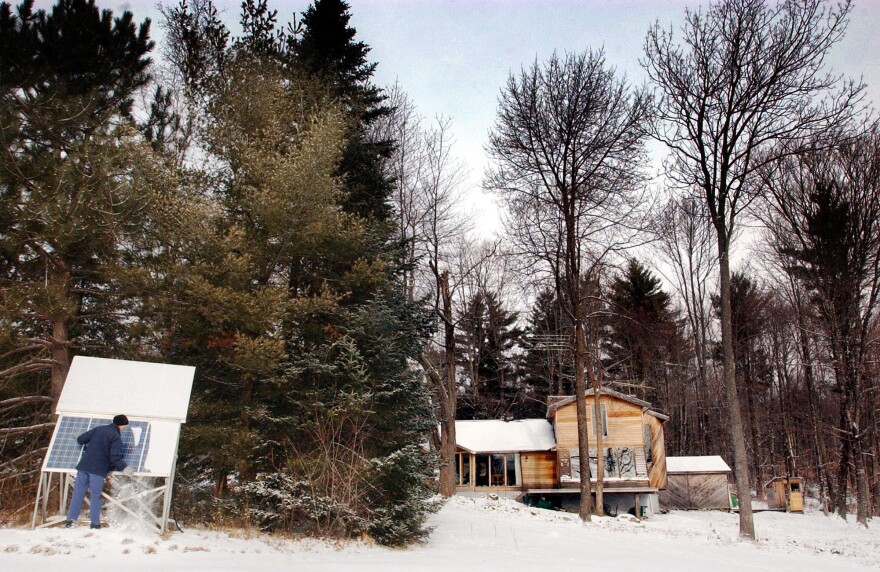There's been a steady drumbeat of dire news about climate change this fall. The latest is a comprehensive government report that foretells devastating consequences for this nation's ecosystems and economy, as well as citizens' health unless significant action is taken right away.
The scale of the challenge can seem overwhelming — even to those who dedicate their careers to documenting and combating climate change. But Mainers who work in the field say that change can start at home.
Even for those in the forefront of climate change research, the findings of the latest studies are pretty daunting.
"For me the big take-home was that climate change is just everywhere,” says Andy Pershing, the chief scientific officer at Portland's Gulf of Maine Research Institute. “It is more and more going to just affect every aspect of our lives, as individuals, as a state, as a country."

Pershing was the lead author of the "Oceans and Marine Resources" section of the U.S. government climate report that was issued the day after Thanksgiving. Meeting the challenges ahead, he says, will require unprecedented action by governments at all levels.
"Then the question is, what does that mean for an individual? I think for an individual, it really comes down to moral leadership, just showing that it is possible to make choices that lead to a lower personal carbon footprint and that it's possible to do that and so that's what we’ve been trying to do,” he says.
Pershing bought a used Toyota Prius a few years ago. Then he converted his home-heating system from oil to electric heat exchangers, which provide efficient air conditioning in the summer months too. He also says he takes the bus or train whenever possible in his frequent travels.
It's the kind of personal effort that other Maine residents whose professions revolve around climate change are making as well. Some choose to live close to their workplace, cutting down on transportation emissions. Some try to eat less meat, whose production generates much more greenhouse gas pollution than plant-based foods. Still…
“To look at this problem and find some good news or optimism about what we could do is difficult,” says Barney Balch, a senior scientist at Bigelow Laboratory for Ocean Sciences in East Boothbay.

Balch studies tiny phytoplankton, which are increasingly challenged by climate change's effects. He makes a lot of public presentations, and he says the question he most often hears is 'well, what can a person do about it?' He was kind of stumped, he says, by the sheer scale of the problem — until he noticed that in the U.S., during some economic slowdowns, emissions were in fact reduced — because carbon-emitting energy production slowed as well.
“I realized that the reason for optimism there is that we humans actually can do something about the trajectory of carbon dioxide,” says Balch. “And that got me thinking, well, heck, at the personal level there are some things we could do to neutralize our carbon footprint."
So Balch and his wife installed solar panels on the roof of their barn and bought an all-electric Chevrolet Bolt.
"It goes about 18,000 miles a year on the energy made by those eight silly little solar panels,” Balch says.
They also converted their heating system to electric heat pumps — powered by more barn-roof solar panels. The result —Balch reduced his carbon footprint by about 22,000 pounds this year, the equivalent of planting 570 trees, he says.
"All of the small changes do really add up in a significant way, and we should not be discouraged by that incremental change that we each make individually,” he says.
For Kathleen Meil, who spent much of her career working for an energy-efficiency contractor, lowering her personal carbon footprint is a process that started close to home.

"I guess my personal actions date back to those days of insulating my 1850s farmhouse to within an inch of its life,” she says.
Meil, who is now a policy advocate for the Acadia Center, an environmental research and advocacy group that says she sought financial assistance from Efficiency Maine. That's a program funded by surcharges on electricity and natural gas bills, and by pollution allowances electricity plants in the region must buy. It helps Mainers offset the cost of bigger ticket items, such as a home retrofit or buying a heat pump.
But even for those who might not have the discretionary income for such purchases, Efficiency Maine is helping with one small buy that can make a big difference.
"The easiest, most easily available thing that everyone can do... is look at their lights," says Michael Stoddard, Efficiency Maine's executive director.
Stoddard notes that at stores throughout the state, ultra-efficient LED the bulbs, subsidized by Efficiency Maine, cost about the same as an incandescent bulb upfront, and will use about a fifth as much electricity.
"It will last you for 15 to 20 years, that bulb,” says Stoddard. “So, if you're like me, and you're worried about your old man getting up on a step-stool to replace light bulbs, which he shouldn't be doing, you can put one in and it will be there for many, many years, they won't have to worry about that."
And, just maybe, worry a little bit less about what they can do to make a meaningful dent in reducing carbon emissions.
Originally published 3:56 p.m. Friday, Nov. 30, 2018.



